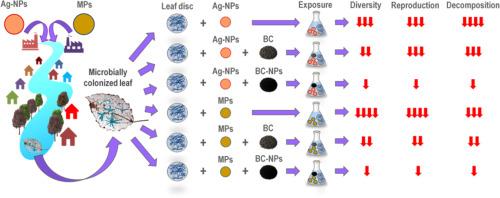Can nature-based biochar and biochar nanoparticles diminish the impacts of silver nanoparticles and microplastics on microbially-driven stream detrital ecosystem?
IF 7.7
Q2 ENGINEERING, ENVIRONMENTAL
引用次数: 0
Abstract
Elevated concentrations of emerging contaminants (ECs), such as silver nanoparticles (Ag-NPs) and microplastics (MPs), are of great concern to aquatic environments. These ECs are released into freshwaters due to improper waste management and may pose risk to freshwater biota and associated ecosystem processes. Conversely, biochar (BC) and biochar nanoparticles (BC![]() NPs) are nature-based products (NBPs), reported to remove some contaminants from environmental samples, particularly soil. However, knowledge about their impacts on freshwater ecosystems, alone or in the presence of emerging contaminants, is lacking. We investigated the impacts of Ag-NPs and MPs (polyethylene) on stream-dwelling microbial communities involved in leaf-litter decomposition, as it is a key ecosystem process, sensitive to water quality. Also, the impacts of the nature-based products, BC and BC
NPs) are nature-based products (NBPs), reported to remove some contaminants from environmental samples, particularly soil. However, knowledge about their impacts on freshwater ecosystems, alone or in the presence of emerging contaminants, is lacking. We investigated the impacts of Ag-NPs and MPs (polyethylene) on stream-dwelling microbial communities involved in leaf-litter decomposition, as it is a key ecosystem process, sensitive to water quality. Also, the impacts of the nature-based products, BC and BC![]() NPs, were assessed in the absence and presence of Ag-NPs or MPs. Both, Ag-NPs and MPs had negative effects on aquatic fungal communities, reducing reproduction, species richness, and altering species contribution, as well as on leaf-litter decomposition in a concentration-dependent manner. Neither larger particles nor nanoparticles of biochar showed any adverse effects on microbial decomposition at any of the concentrations, suggesting their eco-compatible nature in freshwaters; rather, BC
NPs, were assessed in the absence and presence of Ag-NPs or MPs. Both, Ag-NPs and MPs had negative effects on aquatic fungal communities, reducing reproduction, species richness, and altering species contribution, as well as on leaf-litter decomposition in a concentration-dependent manner. Neither larger particles nor nanoparticles of biochar showed any adverse effects on microbial decomposition at any of the concentrations, suggesting their eco-compatible nature in freshwaters; rather, BC![]() NPs stimulated fungal sporulation and leaf-litter decomposition. Moreover, the presence of these NBPs attenuated the negative effects of the tested ECs in a concentration-dependent manner, with more pronounced effects against MPs. BC
NPs stimulated fungal sporulation and leaf-litter decomposition. Moreover, the presence of these NBPs attenuated the negative effects of the tested ECs in a concentration-dependent manner, with more pronounced effects against MPs. BC![]() NPs showed greater alleviation efficiency than BC in aquatic ecosystems. This study emphasizes the importance of stream detrital ecosystem in ecotoxicological assessments and potential role of nature-based resources to deal with emerging contaminants.
NPs showed greater alleviation efficiency than BC in aquatic ecosystems. This study emphasizes the importance of stream detrital ecosystem in ecotoxicological assessments and potential role of nature-based resources to deal with emerging contaminants.

基于自然的生物炭和生物炭纳米颗粒能否减少纳米银和微塑料对微生物驱动的河流碎屑生态系统的影响?
新出现的污染物(ECs),如银纳米颗粒(Ag-NPs)和微塑料(MPs)的浓度升高,对水生环境造成了极大的关注。由于废物管理不当,这些有机污染物被释放到淡水中,可能对淡水生物群和相关的生态系统过程构成威胁。相反,生物炭(BC)和生物炭纳米颗粒(BCNPs)是基于自然的产品(NBPs),据报道可以去除环境样品,特别是土壤中的一些污染物。然而,关于它们对淡水生态系统的影响的知识,无论是单独的还是在出现新污染物的情况下,都是缺乏的。我们研究了Ag-NPs和MPs(聚乙烯)对参与凋落叶分解的河流微生物群落的影响,因为这是一个关键的生态系统过程,对水质敏感。此外,在Ag-NPs或MPs不存在和不存在的情况下,评估了基于自然的产品BC和BCNPs的影响。Ag-NPs和MPs均对水生真菌群落产生负面影响,降低繁殖,减少物种丰富度,改变物种贡献,并以浓度依赖的方式影响凋落叶分解。在任何浓度下,大颗粒和纳米颗粒的生物炭都没有对微生物分解产生不利影响,这表明它们在淡水中的生态相容性;相反,BCNPs刺激真菌产孢和凋落叶分解。此外,这些NBPs的存在以浓度依赖的方式减弱了所测ECs的负面影响,对MPs的影响更为明显。BCNPs在水生生态系统中表现出比BC更强的缓解效果。本研究强调了河流碎屑生态系统在生态毒理学评估中的重要性,以及自然资源在处理新出现的污染物方面的潜在作用。
本文章由计算机程序翻译,如有差异,请以英文原文为准。
求助全文
约1分钟内获得全文
求助全文
来源期刊

Journal of hazardous materials advances
Environmental Engineering
CiteScore
4.80
自引率
0.00%
发文量
0
审稿时长
50 days
 求助内容:
求助内容: 应助结果提醒方式:
应助结果提醒方式:


